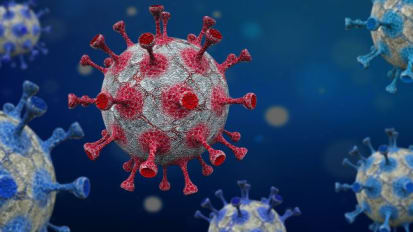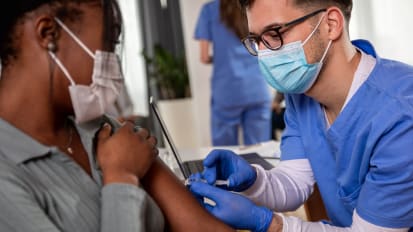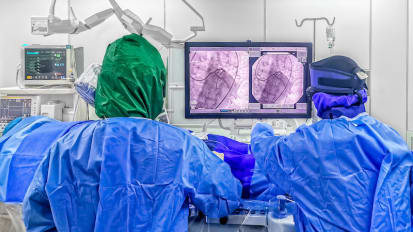Search
 Video
Video
A Pragmatic Update on Respiratory Infections: COVID-19 Lessons, Current Learning Opportunities and Emerging Threats
Infectious disease specialist Peter Chin-Hong, MD, presents the current state of wintertime respiratory illness, focusing on the Bay Area yet covering the reality that viruses are global travelers Video
Video
Getting Ahead of Anal Cancer: Assess Risk and Screen Appropriately to Prevent Advanced Disease
“Don’t assume it's just a hemorrhoid,” says infectious disease specialist Cristina Brickman, MD, MSCE, in her talk on protecting high-risk patients from anal and perianal cancer Video
Video
Fall’s Virus Harvest: What to Know About COVID, RSV, Flu, and the New Vaccines
This talk provides answers to the questions clinicians are starting to hear every day, including how worried to be about current COVID cases, when the latest COVID vaccines will be available, and whether they’ll work better against upcoming variants. Video
Video
Monkeypox Update: Cases, Risks, Treatments and Vaccination
Infectious disease specialist Dr. Monica Gandhi, MD, MPH, delivers the latest on monkeypox (or MPX). Video
Video
Getting to the Heart of COVID: Do Infections or Vaccines Cause Cardiac Harm?
Cardiologist Clifton Watt, MD, offers new insights on the pathogenesis of heart problems resulting from COVID; breaks down the evidence on whether novel treatments – neutralizing antibodies and antivirals – have therapeutic or preventive value; then presents a risk-benefit analysis for the available vaccines, incorporating new data. Video
Video
Get Current on COVID: The Evidence on Vaccine Efficacy and Strategies for Immunocompromised Patients
A panel of experts answers all the current questions on breakthrough infections, who needs boosters, whether to keep recommending masks, and the future of variants, with a spotlight on meeting the needs of the immunocompromised, such as organ transplant recipients and cancer patients. Bonus: what to know about molnupiravir to treat COVID-19. Video
Video
Detecting Less-Detectable Infections: A New Genetic Technique Using Plasma
Metagenomic next-generation sequencing can pinpoint pathogens causing infections in patients with immune function challenges and complex conditions, potentially saving lives as well as lowering care costs. Video
Video
COVID Update: Experts Answer Questions on Boosters, Everyday Risks and What the Future Holds
An expert panel mines the latest data to discuss the COVID-related issues on patients’ minds Video
Video
COVID-19 Vaccines: Up-to-Date Answers on Safety, Efficacy and What the Future Holds
From primary care providers to subspecialists who see immunocompromised patients, medical professionals are facing a barrage of vaccine questions. Video
Video
Long COVID: A New Way to Look at a Growing Problem
Synthesizing multiple studies, pulmonologist Brian Block, MD, reveals which patients are at risk for lasting symptoms from infection with the coronavirus (it’s not who you might think). Video
Video
Prevent and Manage HIV in Primary Care: New Evidence on What Works
Infectious disease specialist John Szumowski, MD, MPH, unpacks recent data and study results that bear strongly on therapy selection, looking at oral drugs versus injectables, new versus standard meds, and how to make the best call for individual patients. Video
Video
COVID Long Haulers: Identifying and Managing Patients With Lingering Symptoms
Predicting which COVID patients will have a post-recovery problem – or what the problem will look like – is tricky. This guide, based on the data, helps doctors follow up in the optimal time frame and by asking the right questions Video
Video
COVID Care and Control: How to Use What We’ve Learned So Far
Pulmonologist Brian Block, MD, submits an enlightening analysis of U.S. COVID data, including his own work examining mortality in overburdened hospitals. Video
Video
A Surge in Sports Stress: How to Support Child Wellness During COVID
Sports specialization and misguided parenting practices have led to undue stress on athletic youngsters, with physical and psychological consequences now exacerbated by the quarantine. Video
Video
COVID-19 Consequences: Is the Ticker a Ticking Time Bomb?
Cardiologist Clifton Watt, MD, explores what’s now known about the SARS-CoV-2 variants as well as COVID-related multisystem inflammatory disorders, explains COVID’s potential for residual effects on the heart, and offers help with identifying COVID “long haulers.” Bonus: update on outpatient therapeutics. Video
Video
Comorbidities and COVID: Care for Patients With Heart Disease and Other Conditions
Breaking down the latest stats, cardiologist Clifton Watt, MD, sheds light on which chronic conditions raise the risk of serious consequences from COVID-19 infection. Video
Video
Keep Them on Their Feet: Vigilant Diabetic Care Saves Limbs
In response to rising rates of diabetes and related amputations, the co-directors of UCSF’s Center for Limb Preservation – which has a limb salvage rate of 92 percent – present a quick guide to detecting amputation risk. They include COVID-specific advice to prevent delays in diagnosis and referral. Video
Video
Get Current on COVID: Case Trends, Flu Season Strategies and Mask Facts
Pulmonologist Brian Block, MD, provides an analysis that clarifies risk factors, in terms of both patient and hospital status. He also discusses how to manage coming flu-related challenges and offers evidence on masking efficacy for both disease spread and severity. Video
Video
COVID Fear and Heart Attacks: Addressing New Obstacles to Care
COVID fear has worsened outcomes for the most dangerous type of heart attack. Interventional cardiologist Krishan Soni, MD, discusses how to respond to the new obstacles and reestablish safe, efficient pathways to lifesaving treatment. Video
Video
Our Cardiologists Address Consequences of the COVID Crisis
The pandemic has both led to delays in heart attack treatment and highlighted racial disparities in health care. Our specialists look at facts and possible solutions. Plus: an update on managing COVID patients at risk of thrombosis and other inflammatory conditions. Video
Video
Asthma Update: 2020 Treatment Guidelines Plus COVID-Appropriate Strategies
Allergist and immunologist Monica Tang, MD, presents the latest on this common condition, from key diagnostic factors and therapeutic choices to which patients should be seen in person during the pandemic. She also gives a glimpse of asthma preventives on the horizon. Video
Video
Stroke and COVID-19: Connections, Concerns and Care
Answering questions from both patients and doctors, our neurovascular disease experts discuss the higher risk of clotting disorders associated with severe SARS-CoV-2 illness and how to manage these cases. Video
Video
Care of Geriatric Patients in the Time of COVID-19
UCSF geriatrician and pulmonologist Leah Witt, MD, discusses how to identify high-risk senior patients, the most common course of the disease, useful monitoring methods and important follow-up on hospitalized patients after discharge. Video
Video
Our Response to COVID-19: Lessons From the AIDS Epidemic
Renowned UCSF HIV/AIDS expert Paul Volberding, MD, who helped pioneer antiretroviral therapy, shares his insights on how the medical community can best respond to the current pandemic. He explains similarities and differences in the health care challenges and emphasizes the value of collaboration.


